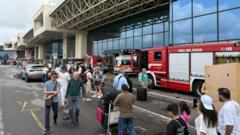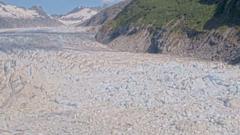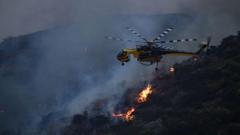Smoke originating from numerous wildfires in Western Canada is causing concerning air quality issues, prompting health warnings in major Canadian cities like Toronto and portions of the Upper Midwest in the United States. Recent reports indicate that Manitoba, which is grappling with its most severe fire season in 30 years, is the source of this hazardous situation.
On Monday, Environment Canada issued air quality alerts as smoke led to hazy skies and unhealthy conditions over Toronto, which has been ranked among the worst globally for air quality. The federal agency advised residents to curtail outdoor activities and issued similar warnings for other regions, including Saskatoon in Saskatchewan.
The situation has also impacted towns across the Great Lakes, notably northern Minnesota, Wisconsin, western New York, and northern Pennsylvania. Ian Hubbard, a meteorologist with Environment Canada, explained that wildfire smoke typically doesn't harm health when it is dispersed in the atmosphere. However, air quality deteriorates when this smoke descends to the ground level.
Although air quality in Toronto is predicted to improve later, the city will continue to experience higher-than-normal temperatures for the week, reaching above 30 degrees Celsius (86 degrees Fahrenheit). The current wildfire season has not approached the unprecedented level of destruction seen in 2023, but Manitoba’s plight remains dire. Rich with unmanageable wilderness, two state emergencies have been declared in the province, with increasing casualties and mass evacuations necessary, particularly in remote areas.
In the context of rising tensions, wildfires have ignited political disputes between Canada and the U.S. Following recent events, six Republican lawmakers from Wisconsin and Minnesota publicly accused the Canadian government of complicity in the smoke crisis and have criticized Canadian forest management methods. Representative Tom Tiffany, vocal in his frustration, demanded accountability while posting images showcasing the smoke affecting his constituents.
While lightning strikes remain the leading cause of Canada’s wildfires, criticisms highlight that many blazes start in areas lacking proper management due to their remote nature. As the battle against these wildfires continues, both nations face the repercussions of contributed climate change effects, testing their cooperative spirit amidst growing bilateral tensions.





















